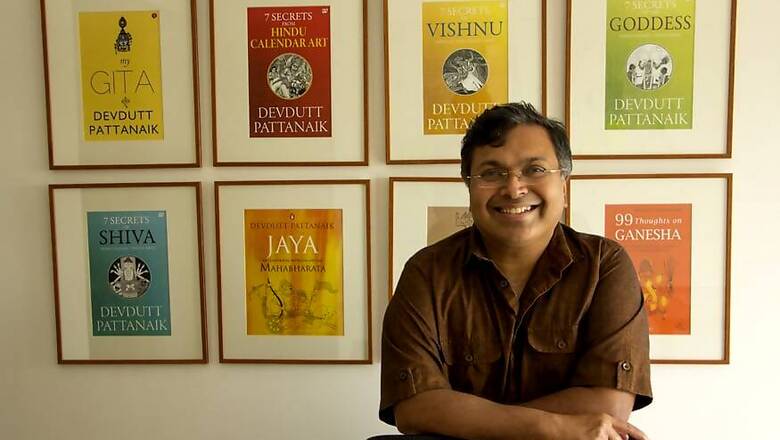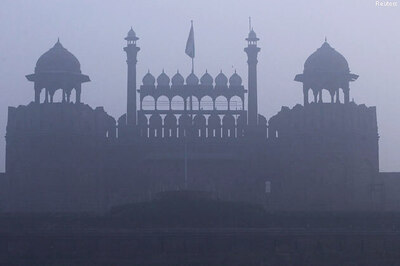
views
The conviction of Dera Sacha Sauda chief Gurmeet Ram Rahim in rape cases has once again turned the spotlight on the damage that the charlatans, who pass off as godmen, do to the spiritual culture of India. Devdutt Pattanaik, writer of modern Hindu mythology, talks to News18’s Eram Agha on this form of ‘crony spiritualism’, which, he says, has nothing to do with religion but with the nature of secular democracy and vote bank politics as practiced in India. Edited excerpts:
Q: Hinduism is said to be a religion with 33 crore Gods. But do godmen have a place in Hindu scriptures?
A: Godmen is a pejorative term created by the media. Every religion, not just Hinduism, has holy men who claim access to an alternate reality — call it spiritual, mystical, magical, or divine. We call them shaman, priest, yogi, guru, mullah. Some are sincere, others are charlatans. Some try their best to help their tribe, flock or followers; others exploit the power they have.
Q: India’s soul is said to be in its spirituality. Bikshus live a frugal life, surviving on alms, so that they can devote all their time to spiritual practices. How much damage do these charlatans inflict to the spiritual culture?
A: Self-realisation has nothing to do with wallet size. This association of poverty with spirituality is a false one. A spiritual person can be a hermit (who has renounced material world) or a householder (who has embraced material world). I still have to find a scientific technique to affirm if a person is an authentic godman or a charlatan. It’s all a matter of opinion, an assumption, just like celibacy, which cannot be proven. Many godmen do wonderful social work, and give dignity to poor people who have been discarded by mainstream society. But simultaneously they may be doing things in their personal life that make them less than holy or worthy of respect. We need to appreciate that bad things can be done by people who also do good things. Life is complex. Simple binaries are for stupid people who cannot handle complexity.
Q: This is a sentence from the court order on Gurmeet Ram Rahim: “Such criminal acts of the convict, who is stated to head a religious organisation, are bound to shatter images of pious and sacred, spiritual, social, cultural and religious institutions existing in this country since time immemorial, which in turn reflects irreparable damages caused by the acts of convict to the ancient heritage of this ancient land…” Do you agree?
A: It is the court’s opinion. And I respect their opinion. But it does sound rather melodramatic. We, as a country, have a history of ministers, bureaucrats and judges who have taken full advantage of their position in the government and done horrible things while in office. It has not taken away people’s faith in the government and the judiciary. There are so many parents who physically and sexually abuse their own children. Have we lost faith in parents? All rapists of women are heterosexual men. Does that mean we have lost faith in heterosexual men?
Let’s not get hyperbolic about these things. Leave that to soap operas. A man who was respected by a large number of people took advantage of his position and behaved in the most inappropriate way. He was caught and punished but the process was not easy. Can we ask the court why it took 15 years to convict him? Who takes responsibility for the delayed justice? Can we say our courts also cause irreparable damage to civil society by their slow inhuman processes?
Q: Many of these so-called godmen with criminal intent use mythology as a cover for their sexual crimes. Ram Rahim reportedly invoked Krishna and his Gopis while coercing — and raping — unsuspecting sadhvis. Does Indian mythology sanction such “salvation” through sex?
A: If you do a simple online search, you will find stories of sex scandal involving Tibetan lamas, Christian evangelists, Catholic priests, Islamic educationists, and secular journalists. I think there is a kind of secular bigotry in saying that a religion provides the framework for sexual misconduct. A rapist uses various tools to entrap his prey. Mythic imagination is one of them. Politicians use their power. Goons use threats of violence. Since we tend to equate holiness with celibacy and sexual continence, it bothers us when holy men turn into sexual predators. These incidents have more to do with power, than with faith. In fact, it is a classic case of loss of faith in the man who inspires others to have faith.
Q: Indian history is replete with towering spiritual figures. These range from sages who wrote our epics to social reformers like Ramakrishna Paramahamsa and Ramana Maharshi. How do we ensure that their memory and legacy doesn’t get bracketed with the deeds of criminals like Ram Rahim?
A: If you read the history of the Catholic Church, you will learn of numerous scandals involving Popes and clergymen. Still the Church remains a respected institution even today. If you read the Vinaya Pitaka, and the rules of sexual conduct for Buddhist monks, you will realize that Buddhist monasteries faced many sex scandals. But all this does not take away the majesty of Buddha’s work. I think we are being rather melodramatic and chest beating over this scandal. This religious leader got caught but there are hundreds of incidents that have not been reported or investigated or convicted.
A few years ago a holy man was caught on camera in his underpants with two women. The video was on YouTube. Today he still has a large number of followers who insist that the incident was an illusion created by the master. Nothing changes. People will seek gurus. And some gurus will take advantage of the power they have over their followers. It was so in the past. It will be so in the future.
Q: Who do you think is the target audience here for the godmen? Is it the new middle-class or the poor?
A: I have heard of godmen and their scandals in my childhood and in my youth. Nothing special about this. Every generation has its holy men and women. Every generation has its share of scandals. We would like to believe our lifetime is unique. It is not.
Q: Or is it that godmen are being able to hijack the faith because Hinduism, unlike Abrahamic faiths, doesn’t offer any single all-powerful figure?
A: Kindly do a Google search and you will find sex scandals involving American evangelists (Protestants), amongst Church priests (Catholics), amongst lamas (Buddhists), Jain sadhus, Islamic educationists, secular journalists and activists. And these are only cases that have been brought to the light. Think of the hundreds of cases that are suppressed by the faithful flock to protect the reputation of the faith.
I think Indians are in a self-hating phase. We want to assume the worst about India. Indian men are rapists. Indian godmen are rapists. Rape is a universal phenomenon but the developed world would like to tell us that our poverty and our religion makes us less than human. We must be careful of such propaganda. We are unkind to ourselves, ashamed of ourselves. And finding vicarious pleasure in self-flagellation.
Q: India has been a secular democracy for 70 years after centuries of Islamic and British rule. Do you think it has been unfair to Hinduism?
A: I realize you subscribe to Hindutva history. Not everyone in the world agrees with this passionate but rather unscientific understanding of the past. Historians certainly will not agree with this simplistic division of India being ruled by non-Hindus; this division was created by the British, incidentally, as part of colonial propaganda. The idea of Hinduism itself is so complex, that it is difficult to put it in a simplistic umbrella.
Wasn’t Ashoka Buddhist? Wasn’t Kharavela Jain? Was Akbar Muslim, or was he the founder of Din-e-Ilahi? What about Marathas who ruled India in the 17th century between the Mughals and the British East India Company? Did the Chera, Pallava and Chola kings of the Sangam period identify themselves as Hindu? India has been ruled by powerful men who professed different faiths. They patronised many faiths while simultaneously persecuting other faiths. In Karnataka, the Lingayats were patronised and persecuted in different times by different kings. In Odisha, some kings chose Vishnu-worshipping Brahmins and others preferred Shiva-worshipping Brahmins.
We must understand that in a secular democracy, vote banks matter. And so this vote bank politics has led to politicians to seek out caste and religious leaders who can get their followers to vote for them. Thus a form of crony spiritualism has been on the rise in the past few decades. It has nothing to do with religion. It has a lot to do with the nature of secular democracy and vote bank politics practiced in India.
Q: One gets to see the rightwing political establishment throw its might behind institutions like Dera Sacha Sauda or any other mutt even in the face of controversies. Do you think BJP and RSS need to bear the burden of these enterprises just because they call themselves Hindu? Shouldn’t they be representing a more modernizing facet of the faith?
A: If a religious or caste leader offers votes, he will be followed by all political parties. Currently since BJP is in power, we see them in a negative light. But this was going on in Congress era too. I am aware of quite a few religious leaders who were patronised by former Prime Ministers. Political parties use religion as an instrument of power. Some use Hinduism, some use Islam, some use secularism. They are sadly more interested in power than governance. And so we suffer. Faith is a private matter ultimately. We may take help of community structures, but ultimately it is a private matter. As soon as faith is used for social engineering and controlling people’s lives, problem starts. You will have religious leaders telling you how to live your life, what to wear, who to have sex with, who to give money to. That is where trouble starts.
Q: When faced with a man or a woman who claims divinity, what would you advise a common man to do? What should be his benchmark to assess a spiritual leader?
A: I would advise people to slap themselves (metaphorically) when they feel divinity rests outside them. When you think divinity is outside you, then you give power to others, and contribute to the creation of monster ‘godmen’. Our body is our temple. Our gods are within our body. This god within can see the gods outside, in everyone’s body. It helps us respect everyone’s temple. The Upanishads say, ‘Aham Brahmasmi’: I am divine. They also says, ‘Tat tvam asi’: So are you. This is true equality at a spiritual level, the diversity of our body, mind and social status notwithstanding.




















Comments
0 comment